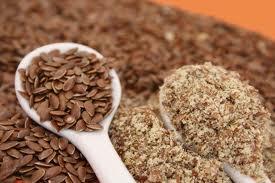Prevention has been gaining more momentum for public health as well as for the health conscious individual. Instead of looking at salvation from a slew of diseases like arteriosclerosis, high blood pressure, osteoporosis, Alzheimer’s, and the complications from diabetes in the form of super pills, prevention looks a lot more promising.
Flax seed has been around for several thousand years, but it has been making a name for itself as part of healthy eating.
Its most important components are its fiber content, the alpha-linoleic acid, and the lignans. Eating flax seed helps to mop up cholesterol in the bowel, and studies have shown a drop in the “bad” LDL cholesterol levels. Duke University is publishing results that show flax seed to be helpful in blocking prostate cancer. A publication going back to August 2001 in the Archives of Ophthalmology point out the fact, that the omega-3 fatty acids, which are contained in flax seed, reduce the risk of macular degeneration. The same omega-3 fatty acids also have a favorable influence in the glucose response after a meal, a fact that is important for the prevention of diabetes.
It has to be mentioned at this point, that flax seed oil does not have all the benefits, as the fiber has been removed, and some of the benefits get lost as a result of the temperature used with processing. Also, just eating a spoon full of flax seeds will not be the answer, as flax seed is not fully used during digestion (the seeds are simply excreted in a bowel movement). To unlock the benefits it is best, to grind the seed.
A coffee mill does the job well enough, and freshly ground seeds are better than the pre-ground variety that has been sitting around in the bin of a store for some time. Two teaspoons of ground flax seed mixed with some yogurt and fruit makes for a good starter in the morning or an easy evening snack. A slice of flax seed bread does not give you the benefits; remember that heat during cooking or baking destroys the key components.
The nice part about flax seed is the fact, that it is inexpensive, plentiful, has no adverse side effects*, and it is the ounce of prevention which is readily available to you.
More info on Omega-3: http://nethealthbook.com/news/inflammation-extinguished-omega-3/
Reference: The Medical Post, October 12, 2004, page 13
* Comments (added Aug.28, 2005): Despite the Duke University study cited above there are disturbing news from a 14 year follow-up prospective study that has been confirmed by other studies showing that there are side-effects. This study showed that in males there is a 2-fold risk of developing invasive prostate cancer when flax seed was the supplement used. As flax seed contains alpha-linolenic acid (=ALA) and fish oil contains eicosapentaenoic acid (=EPA), there are striking differences of action that have not yet been defined in more detail. The same study showed that over 14 years EPA (when mixed with DHA) lowered the risk of getting invasive prostate cancer by 26%. Until it is known more how flax seed works, it likely is wiser to to take a molecularly distilled EPA/DHA supplement daily as this also reduces the cardiovascular risk, but at the same time prevents cancer.
Last edited October 27, 2014






